






















If you continue in My word, then you are truly disciples of Mine;and you will know the truth, and the truth will make you free . . . if the Son makes you free, you will be free indeed.” John 8:31, 32, 36.
The theme for the month of July is “Freedom” (thanks to Arizona’s suggestion).
What does it look like? True freedom?
Secular society seeks political freedom from domination, economic freedom from debt, social freedom from bigotry, emotional freedom from loneliness, nutritional freedom from famine, religious freedom from restriction or interference, personal freedom of choice. In general, the worldview of secular society defines freedom from the point of view of the individual. But the worldview of the Bible defines freedom from the point of view of a relationship with Jesus.
1. Jesus spoke the truth about the character of His Father. Jesus was the truth because His life demonstrated the character of the Father. Then Jesus said if you “know the truth, the truth will make you free.”
2. The truth about the Father is that when we sin, we have chosen to disconnect from the source of life and rightfully we should die – just like pulling the plug of a light causes the light to go out. But God puts us on life support until we can see the truth – that Jesus carried our sins with Him to the cross and died in our place. We now have the choice to accept His sacrifice in our place. We don’t have to die – but live.
Him are abiding in Him. We are so closely connected with Him that we watch everything He does and try to emulate His every thought and deed.
5. This intimate relationship changes our worldview. We see the world and everything in it from His perspective, and not our own. We relate to our physical world as the place He created for us to care for and to appreciate. We relate to our physical body as a holy residing place (sanctuary) for the Holy Spirit who is given to us at baptism to mentor us, gift us, empower us, guide us, and correct us. We relate to our job and career as an opportunity to demonstrate our faithfulness to Him by honoring those for whom we labor with our honest, best effort. We relate to all our neighbors as fellow travelers on this globe with whom we want to share the truth of the gospel we have found in our relationship with Jesus.
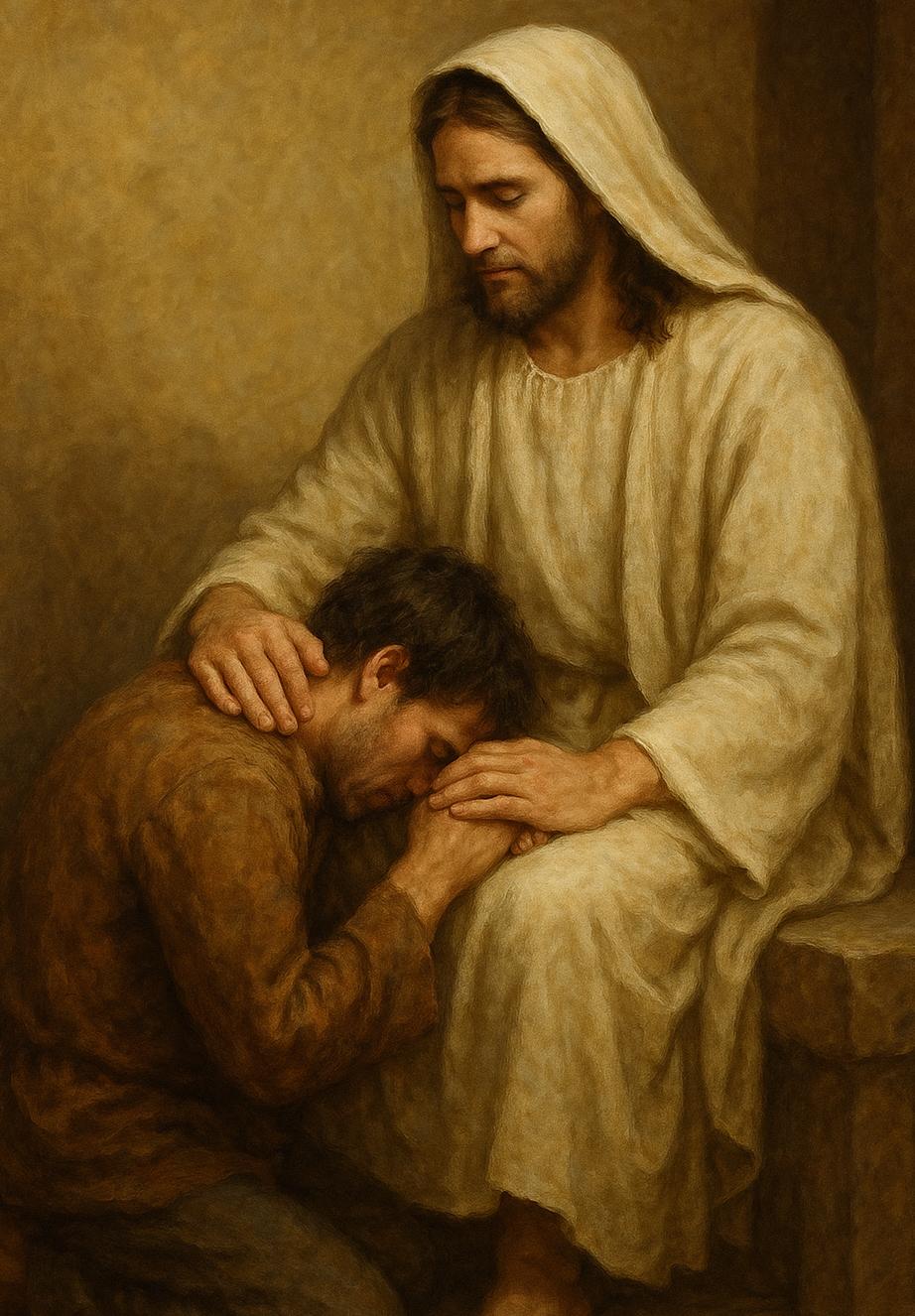
Our Christian worldview makes all the difference. We are set free from guilt, doubt, vengeance, regret, accusations, and fear. “Rejoice in the Lord always; again I will say, rejoice!Let your gentle spirit be known to all men. The Lord is near.Be anxious for nothing, but in everything by prayer and supplication with thanksgiving let your requests be made known to God.And the peace of God, which surpasses all comprehension, will guard your hearts and your minds in Christ Jesus.Finally, brethren, whatever is true, whatever is honorable, whatever is right, whatever is pure, whatever is lovely, whatever is of good repute, if there is any excellence and if anything worthy of praise, dwell on these things.”(Philippians 4:4-8)
These are the guiding principles of our worldview. We don’t need to fret over every crisis as if our world will fall apart. Our relationship frees us from these constant anxieties. Our reference point is God and His constant, abiding love. “If God is for us, who can be against us” successfully? (Romans 8:31)
3. Our acceptance of this truth creates a bond of love between Him and us – He loved us and we in turn love Him. As John 8:31 says, we don’t just believe what He said. We believe in who He is. And believing in Him, we are accepted into this relationship to continue as His disciples.
4. Disciples are those who follow Jesus. We want to think like Him, reason like Him, pray like Him, and act like Him. As John 15:4 and 5 says, we who follow
The difficulty is remembering who we are and to Whom we belong in the midst of every crisis. That’s why prayer and supplication – perseveringly, with thanksgiving – is so important. That’s why we have church family so that we can “consider how to stimulate one another to love and good deeds,not forsaking our own assembling together, as is the habit of some, but encouraging one another; and all the more as you see the day drawing near.”(Hebrews 10:24, 25)
We are grateful to God that the Arden Seventh-day Adventist Church is a loving, supportive church family – His human hands who uphold us through the crises that will come – and frees us.

by Jean Davey and Jim Wetmore
What does freedom mean? It can mean so many different things to so many people. For the sake of this article, let’s consider those who are in prison. Can they experience freedom even when they remain behind bars? The answer is a definite yes!
The website worldimpact.org describes it as “the transformation, redemption, and hope that happens when a prisoner encounters Jesus. Prison can often be seen as a place devoid of hope and redemption, a place where individuals are trapped in their past mistakes. However, Prison Ministries shows there can be a restoration of faith which brings personal growth and hope.”
The Arden Seventh-day Adventist church has a wonderful prison ministry. It has been led by Jim Wetmore since 1981. There are many volunteers who work with Jim and have been able to visit those who are incarcerated over the years. These encounters can be through actual visits to a prison, Bible studies through the mail, and other ways of interacting with the inmates.
As the years have gone by, Jim has encountered many inmates who have been spiritually “set free” even though they are behind bars. The following is his account of these experiences in his own words:
I will share some brief remarks about some who have surrendered to the Lord and have truly been "set free". The names have been changed for privacy reasons.
Ron was living for the world with gusto. You name it and he had done it. When he first shared with me his life of sin, I could hardly comprehend it! God got a hold of him in prison and truly turned him around 180 degrees. He spent the first half of his life more in prison than out. His is a remarkable testimony of redemption. In time after his release, he actually became a prison chaplain! His is a story of slavery to sin and the "freedom" found in Christ.
Will came from a rather dysfunctional home with minimal religious background. He eventually got caught up in the vices of alcohol and drugs. Under the influence you can do some terrible things you would never do otherwise. Sadly he committed a capital offence and is facing many long years behind bars.
However, God had a plan and began moving on his heart. In time he surrendered to the Holy Spirit’s pleadings and surrendered his life to the Lord! Not only that, he was able to be baptized by immersion in the prison chapel’s baptistry by one of our pastors. God is good. Will also experienced being “set free” and is now living for His Lord and Savior.
Betty is another example – a sister in the Lord who has had a remarkable story of how God changes lives. She came froma Bible-believing home and attended church. As she became an adult and married, over the years she got caught up with drugs. They change your life and not for the better. Her life spiraled out of control and one morning when she woke up, she found herself in jail. In time God got her attention and she realized her condition and that she needed Jesus back in her life. She surrendered her life to Him and that was the beginning of a new life in Christ. God has a way of changing our lives for the better and Betty is now experiencing the "freedom" found only in Christ. Eventually, she was released from jail. And of all things, she has returned to the jail as a volunteer to share with and encourage those she left behind when she gained her physical freedom.

I began my ministry to the incarcerated back in 1981 by going to the old (now closed) Henderson County Correctional Unit which housed minimum security inmates. Soon after that, I was asked to be the Arden director for Prison Ministries. We simply get to know the men by getting acquainted with those who come out to meet with us usually once a week.
You can see that I meet up with some rather interesting folk in this ministry. They have become brothers and sisters in the Lord. One thing that keeps me going is when someone says, "Thank you for coming to see me. I appreciate it so much.” Our purpose in ministering is to “set the captives free” – even when they are still behind bars.
Jim invites anyone interested to come join him in this important ministry!

by Chris Small, Sara McCord, Max Hammonds
“So if the Son makes you free, you will be free indeed.”
John 8:36
The following Biblical stories illustrate true freedom – the freedom that prepares us for eternity. Which story best illustrates your journey to freedom?
JACOB – Submission
Jacob thought he had left it all behind – his deception of his father, the anger of his brother, the pain of his father-in-law’s deception toward him, the gradual build-up of his own flocks and herds (by subterfuge), and all the planning and scheming to make it work.
On his way home, he rejoiced in the promises of God (in his dream at Bethel) to be with him wherever he went. He saw the two angel groups in front and behind him, accompanying his entourage returning on the road by which he had escaped twenty year before – and knew God was with him.
break, begging for mercy – even as he continued his struggle until the break of day.
When the finger of the Stranger touched his thigh and crippled him, Jacob knew his assailant was God’s Angel. All thought of conquering in his own strength left him. In his extreme pain, he clung to his Savior with the same tenacity with which he had fought, pleading for a blessing. Persevering, penitent, and not presumptuous, his faith grew more earnest; his desire for assurance of forgiveness and pardon more desperate.
All attempts to earn God’s grace disappeared. He trusted in the grace of God alone, and he conquered and was set free. Jacob – and those who trust as he did – are Israelites (conquerors).
In John 4:1-42, we meet a Samaritan woman who arrives at a well carrying more than just a water jar—she carries the weight of sin, shame, and rejection. Her story is not just a historical account; it’s a testimony of how an encounter with Jesus Christ brings true freedom from the bondage of sin.
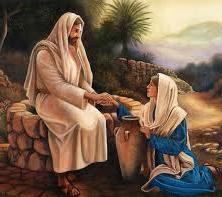
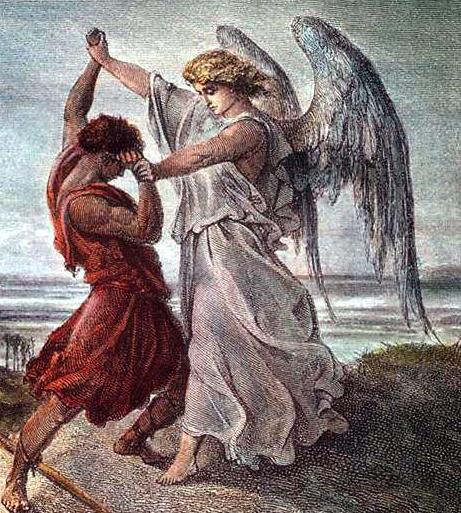
However, the memory of his brother’s anger and the possibility of revenge plagued his days and nights. He reverted to his old practice – doing something himself to secure the safety of his extensive household. When he learned of his brother’s approach with four hundred men, he sent messages of obeisance and gift after gift to assuage the anger and soften the heart of his brother. But he received no answer for any of his efforts, and he was distraught. In great anxiety and fear, Jacob divided his group into two bands, hoping that if one band were attacked, the other would escape.
Upon reaching the Brook Jabbok, Jacob sent all across the river. He remained behind – alone – to pray for God’s intervention with his brother. He had done all he could, and he knew it was not enough. Now he prayed earnestly into the night.
Suddenly a strong hand touched his shoulder. Thinking it was an enemy, he fought back with all his strength. His sense of guilt pressed down upon him, threatening to break his faith in God. Remembering God’s promises, he refused to
The woman comes to the well at noon, the hottest part of the day. This detail is crucial. Most women would draw water in the cool of the morning, but she comes alone, at a time when she knows no one else will be there. Her isolation speaks volumes. She has been shunned by her community, not just for one mistake, but for a lifestyle marked by broken relationships. Jesus later reveals that she has had five husbands and is now living with a man who is not her husband. This points to a life filled with pain, failed attempts to find love, and choices that have left her alienated and ashamed.
Then Jesus enters her world. He doesn’t avoid her or condemn her. He speaks to her directly and compassionately, asking for a drink and offering her “living water.” As their conversation deepens, He exposes the truth of her life—not to humiliate her, but to free her. He shows her that He knows everything she’s done, yet still offers her eternal life, acceptance, and peace. In that moment, the walls of shame begin to fall. For the first time, she is seen not as an outcast, but as someone worth redeeming.
When Jesus reveals that He is the Messiah, everything changes. The woman who once avoided others now runs back into the very town that had shamed her. She boldly proclaims, “Come, see a man who told me everything I ever did!” Her shame is gone. Her fear is gone. The chains of her sin are broken, and she is no longer defined by her past.
This story is a powerful reminder that no sin is too deep, and no person too far gone, for Jesus. The woman at the well was set free because she believed in the Savior who knew her
fully and loved her anyway. In Christ, she found forgiveness, identity, and a purpose worth sharing – the kind of freedom we all need!
JOSEPH – Forgiveness
Today was an exhausting experience, perhaps the most challenging of his life. As Joseph sat alone in his private garden, he reviewed the past challenging episodes of his life.
At seventeen, he was the heir apparent to his father Jacob with privileges and special clothes to mark his status. At eighteen, he was sold on the slave market to a highly placed Egyptian general. At twenty-five, Joseph, an innocent prisoner,wasplacedinchargeofthedeepestdungeonforthe king’s especially offensive prisoners. At thirty, Joseph was elevated to the office of Tate (TAH-tay) or prime minister in Egypt because of his wisdom and humility in interpreting the Pharaoh’s dream about a coming famine of seven years.
During the seven years of abundant harvests, Joseph was busy building granaries and learning to manage difficult political opposition. But when the famine began, everyone turned to him for help. Not only the Egyptians, but the entire world seemed to know that Egypt had abundant grain.
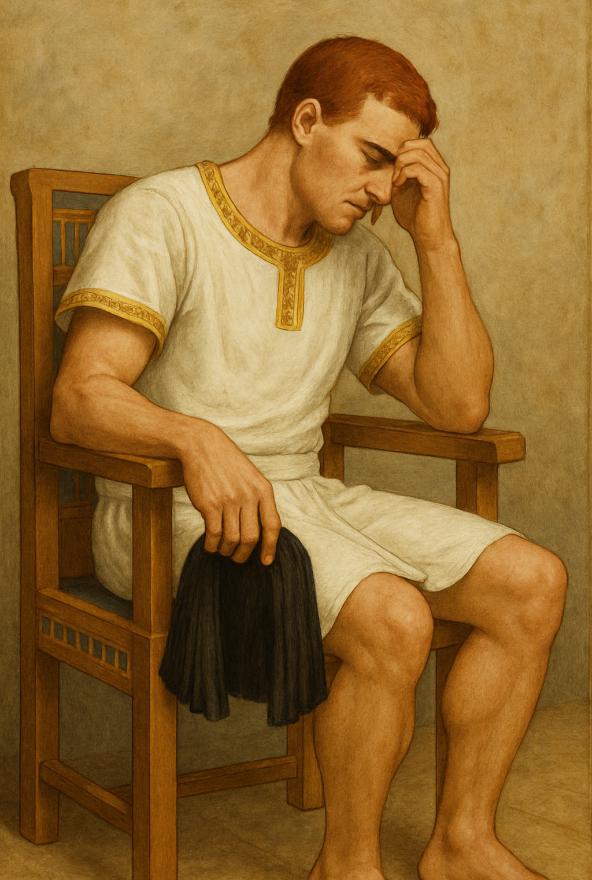
The appearance of his brothers to buy grain reawakened Joseph’s love for his family, especially his father. Throughout the testing of his brothers’ humility and repentance and reuniting with his father Jacob, Joseph remained in control. He settled all seventy of the extended family comfortably in the delta region of Egypt, safely separated from the main Egyptian population. And all was well – or so he thought.
But today. After his father’s death, state funeral, and burial at the Mamre Oaks property, Joseph was prepared to continue his role as the patriarch of the family. Tears came to his eyes again, as he replayed today’s events. His brothers had come to him petrified, wary, distrustful – afraid Joseph would take retribution on them. Their anxieties resurrected his own painful memories of familial separation, false accusations, and disloyalty that he thought had been buried long ago. With bowed head, his eyes overflowing with tears, his heart crushed, Joseph explained again that “God sent me before you . . . to preserve for you a remnant by a great deliverance.” He loved them and yet they had distrusted him.
By remembering God’s precious watch care and guidance, Joseph was able set his brothers free from the captivity of their sins against him and their father. Now, in the peace of his garden, Joseph realized that in forgiving them, he had been freed also. And he quietly wept again.
In the Roman Empire, some individuals are captured and forced to be slaves, some are born into the status of a slave, and still others—like myself—become a kind of slave without even realizing it. It was just a few days before the Passover, the commemoration of a great deliverance from captivity; no doubt that is why Jesus said, “Today rescue has come to this house, for he is also a son of Abraham. After all, the Son of Man came to seek out and to rescue those who are destroyed.”
MoneyIhad,forsellingmyselfout.ButIwascaptivetothat money and to the Romans who controlled it. My reputation was destroyed, my self-worth in tatters, and good as dead to my own people and family. If I had lived in Egypt some millennium and a half ago, I would have been like a taskmaster—used as a pawn by the oppressors to help control the feared Hebrews but also found intolerable by my fellow slaves for betraying them and cracking a whip. Oh, I hated myself for what I had done. I needed triple deliverance: from my Roman overlords, from the bitterness of my neighbors, and from my own self-loathing. Once upon a time, I believed that being a tax collector would save me from being killed by the Romans, but now it was destroying me from the inside.
Like my ancient ancestors I cried out, groaning in my entrapment and the violence in which I’d become enmeshed. Could God rescue me, or was I in too deep? Pharisees and Zealots said tax collectors were a lost cause. But one rabbi, Yehoshua of Nazaret, was reported to treat my kind with acceptance, and it was in hope that he could reassure me of God’s mercy that I felt compelled to see him.
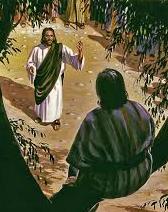
Oh, freedom! When the master called up to me in the sycamore tree, “Zakchaios, come down and I will stay with you,” I realized he knew my name. I understood that the delivering God of Passover would save me and still counted me as a child of Abraham and Israel. I was filled with joy, and—like the Egyptians to the departing Hebrews—ready to give all my money to right the wrongs I’d perpetrated. My freedom, my deliverance is not in Rome or Judah, but in Messiah, his new exodus, and the kingdom of God!
Each of these stories reminds us of the many ways God has arranged to set us free: physically, spiritually, mentally, emotionally, and socially. As we follow “the way of the Lord,” each of us will discover the precise manner by which God has promised to free us individually. “But seek first the kingdom of God and His righteousness and all these things will be added you” – including our freedom. (Matt. 6:33 NASB)

Albert Groot (aka Pawpaw) sat in his favorite chair near the fireplace. The Michigan weather on this July evening was a sultry 82 degrees. But Pawpaw preferred to finish his day indoors in his chair, reading or discussing an idea from the evening devotional book with his grandsons and his daughter, Natalie.
As Pawpaw opened the devotional book, Natalie said, “Father, before we begin, I think Matthew has a topic he wants to discuss with you.”
“O-kay, then. Maybe this is our topic for tonight.” Pawpaw closed the book and laid it aside.
Pawpaw smiled at Matthew, sitting on the floor in front of his mother’s chair. “Matt, what are you wanting to talk about?”
Matthew took a deep breath. “Well, our freshman Bible class was discussing baptism and our teacher asked how many of us had been baptized. I and another guy were the only two not yet baptized.”
Pawpaw turned to Mark, his oldest grandson, on the hassock near Pawpaw. “Mark, how old were you when you were baptized.”
sure I’m doing it for the right reason – and not because everyone else is doing it.”
“Good for you.” Pawpaw nodded in agreement. “That happened when Constantine tried to baptize his army. He marched them through a river. All he got was wet soldiers. Baptism isn’t a magic act to make Christians out of heathens.”
“Then, why do we get baptized, Pawpaw?” Matthew asked.
“I thought you would never ask,” Pawpaw laughed. “What does your Bible app say in Romans 6:3 and 4 about why we get baptized?”
Mark opened the Bible app on his phone. “It says we are being baptized into Jesus.”
“Oh, fantastic. Good for you.” Pawpaw nodded vigorously. “Yes, into His death, it says. Do you actually die? Do you stop breathing?”
Matthew laughed. “Only while you are under the water.” The others laughed with him. “It’s a symbolic death, Pawpaw.”
“And it says we are united with Him in His death,” Pawpaw added. “How does verse six and seven explain what happens to us and our sin when He died?”
Matthew studied the verse for a moment. “I think our sinful life died with Him.” He paused.

“I was eleven,” Mark answered.
Pawpaw nodded his head. “Yes, I’m thinking that most kids in church school have already decided on baptism by age fifteen. That’s how old you are, isn’t it, Matt?” Matt nodded his head. “Weren’t you going to be baptized when you were eight or nine at summer camp?”
Matthew looked down, examining his hands. “Yes. That was the year Dad was killed while working on the bridge.”
Pawpaw furrowed his brow. “You know God didn’t want your father to die on that bridge, yes?”
Matt looked up into his grandfather’s eyes. “Yes, Pawpaw, we’ve talked about this before. We live in a sinful world where bad things happen to good people.”
Pawpaw glanced at his daughter, who was biting her lip. “Okay. So, why are you waiting?”
Matt cocked his head to one side. “I just want to make
“And – what are we set free from, Matthew? That we will never make any mistakes ever again?” Pawpaw was watching Matthew’s face, waiting for the “aha” moment.
“No, we make mistakes. But we are set free from the . . . from the consequences of our sin – death, the wages of sin. Because we have already died in Him.” Matthew smiled up at Pawpaw.
“And therefore, in verses seven and eight. What else are we set free from?”
“We are also set free from –death. No . . . from the fear of death.”
Pawpaw took a deep breath. “Now, verses 8-10. We can live the life that He lives because . . .” He paused. “In verse 3, Matthew. What do you think ‘into’ means?”
“It means into a relationship with Him, Pawpaw.”
“Matthew, do you love Jesus for making this all possible – for you – personally?”
“Yes, sir, I think I do.”
“Are you ready to follow Jesus as your Lord and Savior?”
“Yes, sir. I think I am.”
“Then you already know what to do, don’t you?”
Matthew suddenly stood up. “Excuse me, please. I need to go call the pastor.” He looked at his mother –who quietly nodded through her tears – and quickly left the room.
Pawpaw watched him go. “He’s a very intelligent young man . . . like his father was.”

Free-dom. Free-dom. Free-dom. Each beat of Peter’s heart and each quiet slap of his sandals on the paving stones felt like a syllable of rescue as he followed his guide toward the iron gate separating Herod’s palace and dungeons from the city proper. Maybe it was all a vision, a dream, and in a few minutes he would wake up, bound by two chains to two guards, ready to make this very same walk in the light of day to a very public execution.
It was less than a decade and a half since Peter’s master, Jesus, Messiah and rabbi from Nazareth, had stood in the courtyard of this palace, built by His would-be-murderer, Herod the Great, then taken over by the Roman governors of Judea. Jesus had faced Pontius Pilate, who proclaimed Him innocent, but ultimately turned Him over to a mob who called for His murder and a company of soldiers who escorted Him though this gate, through the city, to Golgotha—Skull Hill— where they crucified Him like a common criminal, to die of shame and torture in public view.
Because he retold this story on the anniversary of Passover/Feast of Unleavened Bread, Peter found himself in the same prison. Jesus had a speedy overnight trial and was executed the following day during the feast. Peter’s trumped up trial and execution would wait until just after the festival was over. The Roman governors were temporarily gone, and because he supported Claudius, the new emperor, Herod Agrippa now ruled from his grandfather’s palaces in Caesarea and here in Jerusalem.
death. And not just His death, but His resurrection – which gave power to the entire movement! Peter was one of many eyewitnesses who had seen Jesus alive again, and walked, talked, even ate with Him. What did it matter if James, or any of them, was executed? Their master, whom they called the true Messiah King, could wake them up from death whenever He chose – as He had awakened the little girl in Capernaum, His friend Lazarus in Bethany, and Himself, walking out of Joseph of Arimathea’s new family tomb right here in Jerusalem!
Peter loved to tell this story over and over. So much so, he didn’t mind explaining how, in great fear, he had denied all friendship with his beloved rabbi.Although he grieved at the time, the risen Jesus forgave Peter, asking him to care for His people and share the story with others. And so he did, showing how Jesus was the fulfillment of all Torah and Scripture. People listened, and the fellowship of those walking in the Way continued to grow.
However, for Agrippa, what a coup it would be to kill this mighty preacher immediately following the festival anniversary of Jesus’ death and resurrection. Perhaps the memory of Passover and the escape of the Hebrews from slavery to the Promised Land after killing a lamb and eating unleavened bread caused the king to imagined himself as a new Moses, a new David?
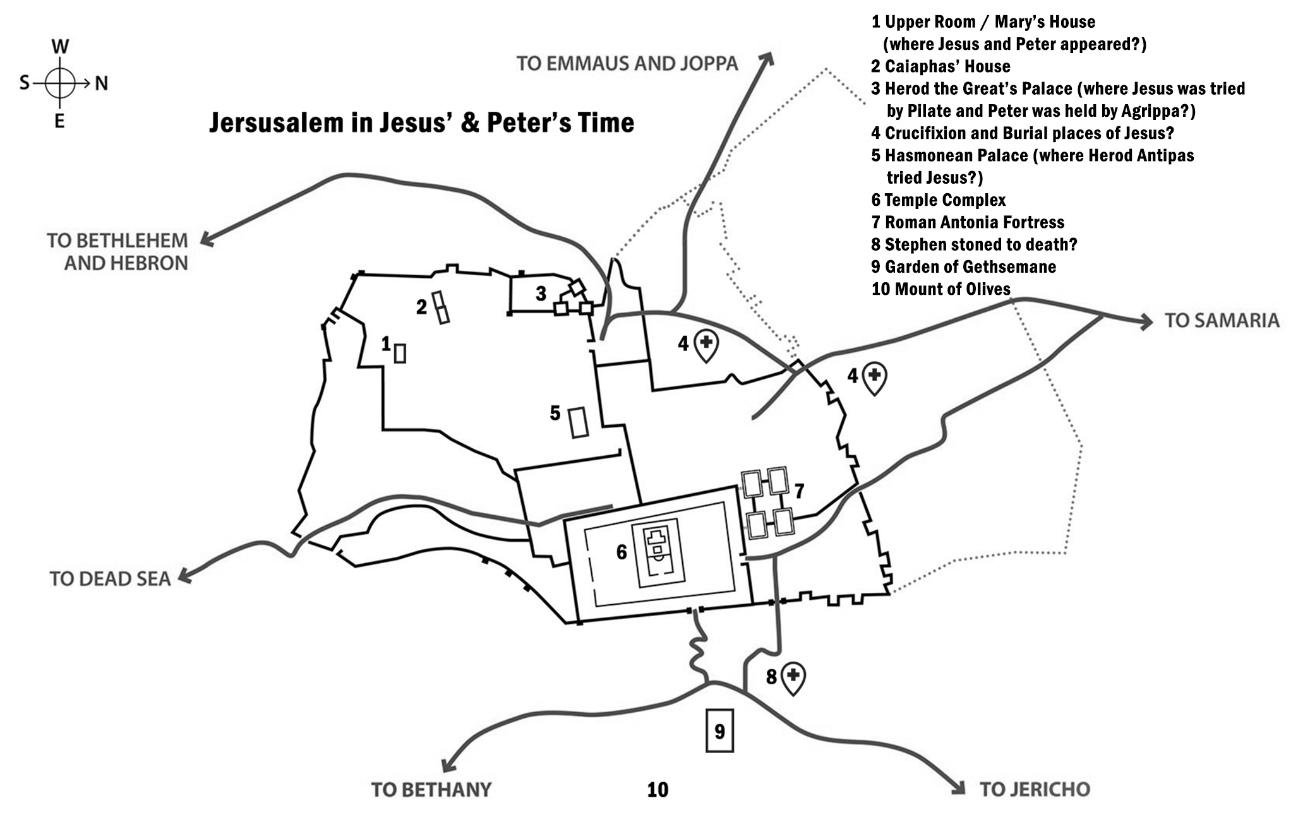
In the prison cell, Peter prayed for strength to die like Jesus, without a murmur, except to ask God to forgive and change the hearts of his executioners, so that they too could experience the unbelievable joy of walking with Jesus.
But during the last night of Passover, before the sun could rise on Peter’s trial and execution day, he was awakened in his cell by a shining messenger striking his side. The chains fell off his hands. The two passed by four guards who miraculously noticed nothing. Without anyone touching it, the great iron gate swung open soundlessly. They passed from the palace area into the narrow streets of Jerusalem, and the messenger disappeared.
Mere months ago, Agrippa had executed James by the sword, pleasing some of the same Jewish leaders who had called for Jesus’ crucifixion, thinking they could stamp out what they thought a dangerous cult, threatening the stability of their Jewish faith and future. Perhaps Agrippa, whose grandmother came from a priestly line, could be the start of another Hasmonean-style king-priest dynasty, leading to peace with Rome and a rebirth of the Jewish kingdom.
But Peter spoke out about a different Messiah. He did it every day, but even more boldly on this anniversary of Jesus’
Free-dom. Free-dom. Each beat of Peter’s heart and each quiet slap of his sandals on the stones felt like a syllable of rescue. The Festival of Passover and Unleavened Bread was still a time of freedom! As the Israelites walked out past the Pharaoh’s palace, so Peter walked out of the grasp of a new oppressor, from Agrippa’s palace and prison. As Jesus had awakened and stepped out of the tomb, so Peter was now awake, stepping into the same city to once again testify for his risen Lord.
Free-dom. Free-dom. Freedom in Christ!
(Based on the story found in Acts 12.)

Fifty years ago we would have thought it ridiculous to buy water in bottles. We had water available to us in faucets located most everywhere. Only the well-to-do would have the money to buy “elite” water – like Perrier – and then only to drink at a posh restaurant.
Today whole aisles of almost every grocery are devoted to water – in bottles. In 2023, Americans spent $49 million on nearly 16 million gallons of bottled water. It seems we have developed a reticence to drink tap water.
Safe tap water is available in all the developed countries of the world thanks to a multitude of safety standards in the United States, the UK, Europe, Australia, and Japan. In general, since the mid-1960’s, normal tap water has had to pass strict regulations from the EPA (Environmental Protection Agency) in every municipality for mineral content, bacterial contamination, commercial fertilizer residues, and contaminants from industrial run-off. For the 43 million Americans (11% of the US population) who get their household and drinking water from private wells, the testing is up to the individual householders.
In the last 30 years, we have become very particular as to how our water smells and tastes. Although the occasional sulfur-like smell, chlorine taste, or discoloration does not necessarily mean that the water is contaminated or unsafe, we all know that tap water at the beach smells and tastes quite differently from city water or mountain resort water.
in plastic bottle in high heat over time, the chemicals use to make the water bottles transparent and flexible – bisphenol Aand others – can leach into the water with similar results.
Nevertheless, we want our water to taste and smell a certain way and we are willing to pay for it – in bottles.
Now entrepreneurs are capitalizing on our heightened fixation on water to promote and produce for sale bottled water with special additives.
“Bottled Water” is water from a municipal water system with some purification measures or filtration methods that change the taste. “Spring Water” is rain water that has moved underground to a particular spring. FDAregulations require that “spring water” have the same composition as the water from that spring. “Mineral Water” is spring water that certifies the water contains at least 250 parts per million of the minerals and trace elements present in the original spring water.

“Alkaline Water” is water with an altered alkaline content (higher pH). The contention is that this will neutralize acid in the bloodstream either for enhanced workout recovery or disease prevention. The pH (acid content) of the blood stream is extremely tightly controlled by the body’s own chemical machinery. Only serious disease can change that control. The pH of the stomach can be changed by medicines that slow the production of stomach acid such that certain minerals necessary for proper body functions –calcium and iron, for example – might not be properly absorbed. But additives in water will NOT appreciably change stomach acidity and will certainly NOT change blood pH. To do so would put an individual at extreme danger for major body dysfunction. “Enhanced Water” has micronutrients, vitamins, and minerals added. These vitamin additives are usually Vit. C and/or B which are water soluble. The kidney will immediately eliminate any that are not immediately needed. These waters frequently have sweetener for an inviting taste.
As health education experts have increasingly emphasized the need for maintaining hydration, everyone knows they must drink their daily four liters for males and three liters for females. As a result, Americans are seen in every venue –sports arenas to church services – carrying bottled water or specialized water containers.
The US Food and Drug Administration (FDA) strictly regulates those companies who produce and distribute bottled water. The same standards for sanitation and content are required in bottled water as for tap water. But, the plastic bottles themselves can break down over time introducing microplastic particles into the water which may negatively affect the functioning of the endocrine, immune, and reproductive systems. Also, when water is allowed to stand
“Electrolyte Water” is intended for athletes and workers in extreme heat who lose large amounts of water and salt by sweating through extreme exertion. These drinks are not necessary for moderate exercise as food and water are sufficient to replace the water and salt. These drinks can also be useful in coping with salt and water loss by vomiting and/or diarrhea.
“Hydrogen Water” is plain water with hydrogen bubbled through it. The small amount of hydrogen contained in this water is miniscule compared to the high acid content of stomach acid. The results claimed for this water are not wellsubstantiated.
Water, water everywhere. But certainly plain, safe water is readily available to everyone. Be knowledgeable about water sources and additives. Be smart about where you spend your money.

Insert a different letter of the alphabet into each of the 26 empty lines to form words of five or more letters reading across. The letter you insert may be at the beginning, the end, or in the middle of the word. Each letter of the alphabet will be used only once. Cross off each letter in the list as you use it. All the letters in each row are not necessarily used in forming the word. Use the Bible clue (Luke 1-4 NASB) when you are stuck, but NOT before you have gone through the entire list. Example: In the first row across we have inserted the letter B to form the word BABY.
A B C D E F G H I J K L M N O P Q R S T U V W X Y Z
#1 X C O R B A B Y P S W I T (2:12)
#2 D E F L O C __ I L L O W S (2:8)
#3 C A N A D A G H T E R Y (2:36)
#4 M O T H E R __ D E M O N S (3:1)
#5 F A I N T E __ A C T O R S (1:4)
#6 C L A B R A A M B S E Z (1:55)
#7 D R O P R O ___ L A I M I T (4:19)
#8 T A M E R C ___ A N G E R Y (2:12)
#9 P A R E N T H E A T E R (2:7)
#10 B L O A M A ___ E D O U T S (2:33)
#11 R B A R R E ___ I S T E R Y (2:3)
#12 E N D O P R I S I N G E (2:13)
#13 S D I M W I ___ O W L E T S (2:37)
#14 S M Y A B I ___ A H C H E W (1:5)
#15 N D E S C E D E D U C T (3:22)
#16 U M U L T I ___ U D E S T R (2:13)
#17 O U T S H E ___ H E R D S O (2:8)
#18 D M A L T A R A I D E R (2:10)

#19 M O S C A E ___ A R T E R Y (3:1)
#20 H A I R P I ___ A T E W A Y (3:1)
#21 S C R A M B __ R T H M E T (2:6)
#22 G R A N D E ___ I L B E S T (4:6 )
#23 D E B P R A ___ I N G E R S (3:21)
#24 C H A M B E _U O T E R S (4:23)
#25 I N B E T W ___ L V E I N G (2:42)
#26 P A N S W E ___ E D S D A Y (4:8)

by Max Hammonds
Apoor Seventh-day Adventist (SDA) literature evangelist (Wladek Kuzma) and his wife (Elza) and family were trying to survive in the midst of Nazi Germany’s invasion of Poland during World War II. Seventh-day Adventists were especially in danger as the seventh day Sabbath might misidentify them as Jews. They survived by adopting German names (Kutzman) and speaking German (as Elza’s maiden name was Gartz and in Poland many people spoke Polish and German. After the failed invasion of Russia and as the German army wasretreating back acrossPoland, Wladek wastaken as a forced labor worker, separating him from the family. He escaped and fled toward the British-occupied section of Germany, hiding his Polish identification papers until he could use them to be housed in a displaced persons camp near Hamburg.
The mother Elza and her four children were trapped in Russian-occupied Communist Poland where they became Polish again, dropping their German names and identity. After two years when Elza received a letter from her husband telling her that he was alive and where he was living, she joined an escape plan from Communist Poland which required the family to become German again to cross the border, yet always hiding their Polish ID papers that they would need in the British-occupied territory to make their way to the displacement camp.
began to pray. What if the policeman opened the black satchel and discovered their Polish papers? They would be gone to Siberia like the others.
Elza and her children stood stiffly next to their belongings when the official commanded, “Don’t move!” As they anxiously watched, he started to search through every suitcase and every box and bundle, getting closer and closer to the black satchel.
Krysia, the second daughter, stood on the opposite side of the pile of belongings, near the black satchel. Mama caught her eye, then looked at the satchel and moved her head slightly. Krysia understood. When the NKVD man moved to check the contents of a box with his back slightly turned, Krysia quickly moved the black satchel to the pile of suitcases already searched. But the metal latch of the satchel struck the floor. The NKVD man whirled around and shouted, “I told you not to move!” He knew something had happened but he didn’t know what. In a moment, he turned and continued his search. When the search was finished, Elza and the children began to silently praise God. Then the NKVD man said, “I think I missed something.”
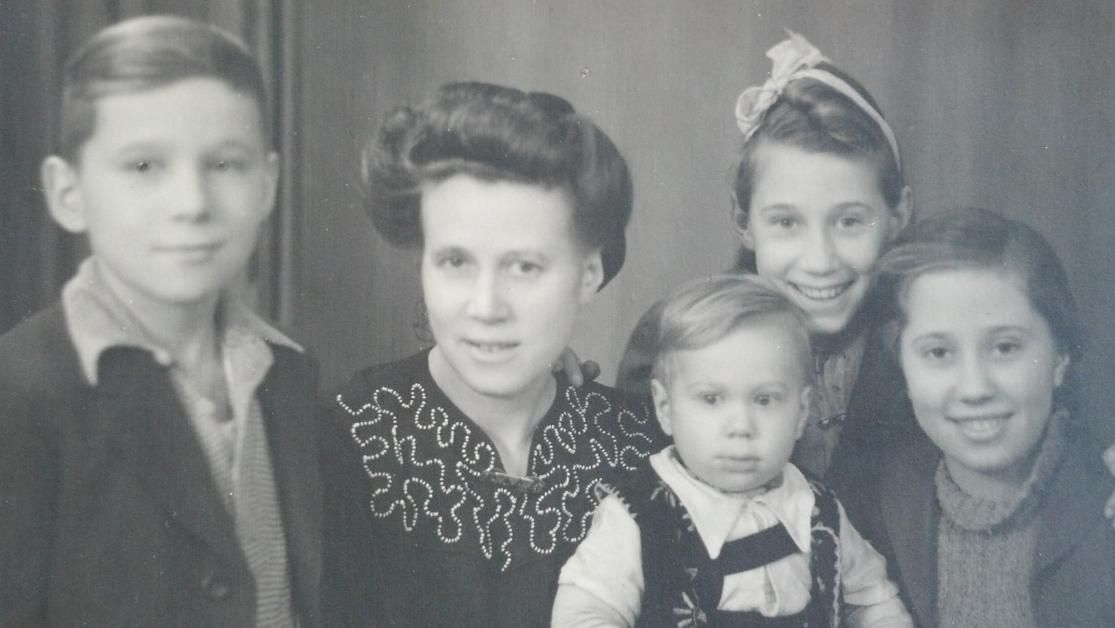
The family had thought they were safe; they had escaped detection. The man made the family move away from the pile, began his search again, moving closer and closer to the satchel. It was impossible for the family to move the black satchel this time. It was obvious to the whole family that all the boxes and suitcases would be opened with their contents in full view. All they could do was fervently pray! At last his hands touched the black satchel. He picked it up and did a strange thing. He lifted the satchel, looked at it strangely, shook it slightly and said, “I looked through this, didn’t I?” and tossed it onto the pile. He stood and left the room.
Janek, the oldest son, said later, “If God never worked another miracle for me, the ‘black satchel’ experience was enough to know that God was a God of miracles. When we are utterly helpless and God breaks into our world in such a forceful way to make a highly trained secret policeman do something so irrational, that’s really powerful.”
Pretending to be Germans, Elza and the children were in theborderprocessingcampwheretheGermansoldiersand the NKVD (the Russian secret police) were watching to catch people illegally crossing – like the Kuzma family. Then it happened! The NKVD discovered two boys smuggling gold coins into the camp. Their family was expelled, and the “Kutzman” family was closely watched because the girls had been seen talking with those boys. WhentheNKVDpolicemanappearedattheirdoorwithout warning and demanded to search their belongings, they all
The “Kutzman” family safely passed the border crossing between Poland and Germany. They switched identities once more to being Polish and connected with their father Wladek in the Displaced Persons Camp. Eventually, the reunited family made their way to Bremerhaven to board a ship bound for New Orleans in the United States – and freedom.
To read the entire story of the Kuzma saga, see Elza’s Quest by Kay Kuzma, Teach Services, 2024 – from which this segment was excerpted. Dr. George (the youngest child in the story) and Kathy Kuzma are best friends with the author of this article.

Our family focus this month features Ryan, Kelly, and Emma Kimbley. Ryan joined the Arden Seventh-day Adventist Church in February of this year and their daughter Emma joined by baptism on December 14, 2024.
Ryan was born and raised in Owensboro, Kentucky as a Seventh-day Adventist and had three brothers, one of whom is deceased. Ryan attended Mt. Pisgah Academy, graduating in 1992. He graduated from Florida Hospital College (AdventHealth University) in 1997 as an Imaging X-ray Technician. He also attended SouthernAdventist University for several years.
Kelly, born in Asheville, has lived in Western North Carolina her entire life. She graduated from A.C. Reynolds High School. She has one brother and one sister. Ryan works for Mobile Radiology that provides mobile x-ray, ultrasound, EKG, and other imaging equipment in a patient’s location, such as a nursing home or a patient’s home. They travel throughout North Carolina providing this much needed service.
Kelly worked for Mountain Care for seventeen years beginning in 1999, an adult daycare for those with memory issues. Then she worked for Pisgah Valley Retirement in Human Resources for six years. In 2015 she began working at Mobile Radiology with Ryan and in 2023 returned to Mountain Care.
Ryan lived in Orlando, Florida from 1994-2011, then returned to this area. His mother is Arden church member Ella Kidder. His step-father, David Kidder, played matchmaker and introduced Ryan to Kelly (who worked for David). They dated for two years and were married on January 12, 2013. They have one daughter Emma who is eleven years old. She attends Capt. Gilmer School and enjoys being part of the Arden church since her baptism last year.
Ryan has lived in Kentucky, Ft. Lauderdale and Orlando, Florida and Western North Carolina. He enjoys bowling, gardening, and walking for exercise. He has traveled to Jamaica and many of the United States and enjoyed going on ski trips to Colorado while growing up. Kelly enjoys cooking, baking, and loves to entertain. She also likes to be outside walking and tending her raised-bed vegetable garden. She enjoys going to the LPC and working out with Emma and her friend, Vicki.
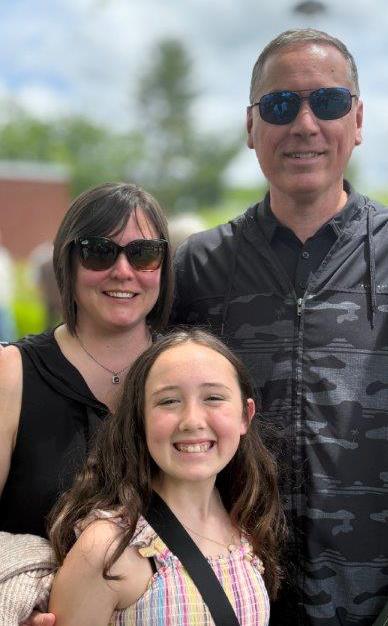
Kelly grew up in a Christian home, going with her parents to a Southern Baptist church. They were very involved in the church, attending Sunday mornings, Sunday evenings, and Wednesday evenings. Having been introduced to the Adventist message, Kelly is taking her time with studies, prayer, and enjoying learning more. Since being introduced to the health message, she has found being mostly vegetarian has helped her own health and feels it is better for her blood type.
When Emma was in the third grade she began asking questions about being baptized. Ryan and Kelly wanted to be sure she was ready to make this decision and asked her to take her time. She took Bible studies and basically said she was ready! She took more Bible studies with Pastor Eric and was baptized. She is in the Junior Sabbath School class.
Ryan, Kelly and Emma visited the Arden church because of family being at Arden. Although they considered Mt. Pisgah Academy Church as their home church, when visiting theArden Church, they fell in love with it and love Pastor Eric. They feel it is such a friendly church and especially enjoy the Sabbath school class led by Josh Belanger.
We welcome Ryan, Kelly, and Emma to the Arden church family!
Arden Seventh-day Adventist Church Is a Safe Place to Grow.
Our Purpose is, by God’s Grace, to reflect His character in our community, to demonstrate a quality of life that will attract all to be reconciled to Jesus Christ, and to encourage people to become His loving, maturing disciples.
Grace Notes Editorial Staff:
Max Hammonds......................................Editor
Chris Small.........................................Columnist
Jean Davey.........................................Columnist
Max Hammonds..........Reporter & Columnist
Pen Braister-Sturgis.............................Reporter
Sara McCord.........................................Reporter
Dan Reynolds.......................................Reporter
Arizona McCord.......Reporter & Proofreader
Chris Small .............................Special Graphics
Jim & Carolyn Sullenberger........Proofreaders
Nolan Darnell................Mailing Management
Shirley Wallstrom..........Circulation Manager
Whitney Barron.........................Layout Design
Comments, suggestions and praises are always welcome. Please email or contact the church office.
Services each Saturday morning: Sabbath School Bible Study, 9:30 a.m. Worship Service, 10:45 a.m.
Location: 35 Airport Road, Arden, NC 28704 Located on Highway 280, (Airport Road), 1.5 miles east of I-26 exit 40, and a quarter mile west of Highway 25.
Church Office:
Office Manager: Cindy Cottrell
Office Secretary: Summer Cronin Telephone: (828) 684-6700
Email: office@ardenadventist.org
Website: www.ardenadventist.com
Office Hours: Mon., Wed., Thurs.,9 a.m. to 3 p.m.
Arden Adventist Pastoral Staff: Senior Pastor: Eric Bates, D. Min. Email: ebates@carolinasda.org
Associate/Youth Pastor: Rich Maskelony, M .Div. Email: rmaskelony@carolinasda.org
Grace Notes is published monthly by the Arden Seventh-day Adventist Church. Subscription is free by calling or emailing the office. †Do you have questions about what Adventists believe? Would you like to become a member of the Seventh-day Adventist Church? Would you like to study the Bible? You are invited to attend a Pastor’s Bible Study Class. Please call for location and time. All are always welcome.
† Disclaimer—The contents of Grace Notes, such as text, graphics, images, and other material contained in this magazine of the Arden Seventh-day Adventist Church are for informational purposes only. It is not intended to be a substitute for professional medical advice, diagnosis, or treatment. Always seek the advice of a qualified healthcare provider, who is knowledgeable and experienced in the use of specific medical or Lifestyle Medicine interventions, or about questions you may have regarding a medical condition. Never disregard professional medical advice, or delay in seeking it, because of information published in this magazine. Neither Grace Notes nor the Arden Seventh-day Adventist Church recommendorendorseanyspecifictests,products,procedures, opinions, or other information that may be mentioned in published articles. Reliance on any information provided is solelyatyourownrisk.Ifyouhaveamedicalemergency,call your healthcare provider or 911 immediately.


Arden Seventh-day Adventist Church
Airport Road Arden, North Carolina 28704 (828) 684-6700
If you no longer wish to receive Grace Notes, or if your address has changed, please contact us.


What is it in our restless hearts that cannot graciously receive a gift?
A friend invites us to a grand, delightful meal, and even before dessert is served, we’re busy evening the score. We fail to taste the kindly moment because we’re painfully obsessed with making certain our account with one we call a friend is “balanced”—even though it is a dinner spread and not a spreadsheet gleaming in the candlelight.
And so we say to God when He so kindly offers us eternity through what His Son has sacrificed: “That’s truly nice—and in exchange I’ll do 10,000 good, obedient things that makes it seem I’m less in Your debt, and somehow more deserving.”
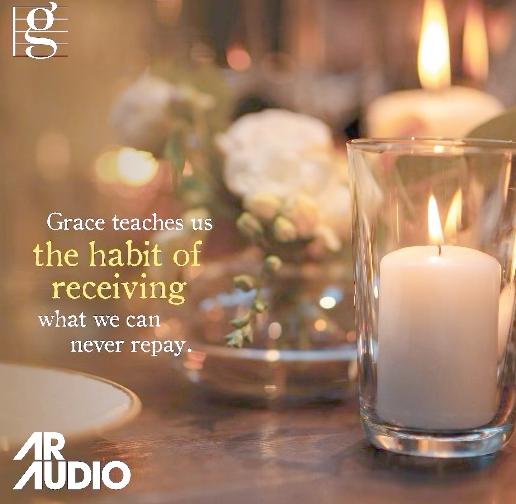
Grace wounds our pride by disallowing all our offers of equivalence. There is no service we can offer God that even starts to mitigate His gift. Our prayers, our gifts, our sweat, our pain do not begin to make us anything but debtors to the kindness we’ve been given. “In this is love, not that we loved God but that He loved us and sent His Son to be the atoning sacrifice for our sins” (1 John 4:10).
Grace teaches us the habit of receiving what we never can repay—of reveling in it, and telling strangers just how blessed we are. A heartfelt “thank you” is the best response when offered joy, and peace, and freedom. Then stay in grace.
-Bill Knott


19-oz Can chickpeas (garbanzo beans) Juice of 1 large lemon (1/4 C) 1 Red pepper 1 Tbsp- White vinegar 1 Cucumber 2 Tbsp- Olive oil 2 Celery stalks ½ C- Chopped fresh parsley Servings per recipe:6 1 Cup- Halved grape tomatoes
Drain and rinse chickpeas and put in a large mixing bowl. Core red pepper and dice into half-inch squares. Add to bowl. Peel the cucumber; slice lengthwise and chop. Add to bowl. Add halved grape tomatoes.
In a measuring cup or small bowl, whisk lemon juice, vinegar and olive oil. Pour over salad ingredients. Toss well to coat all ingredients. Add parsley and mix again. Refrigerate until ready to serve. Season to taste and serve chilled.
